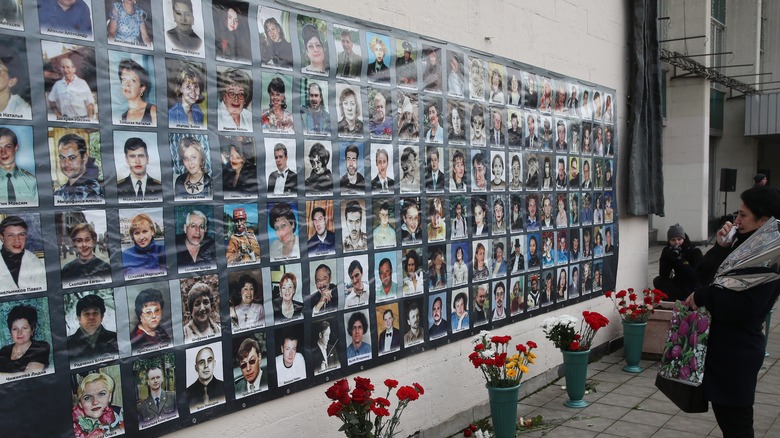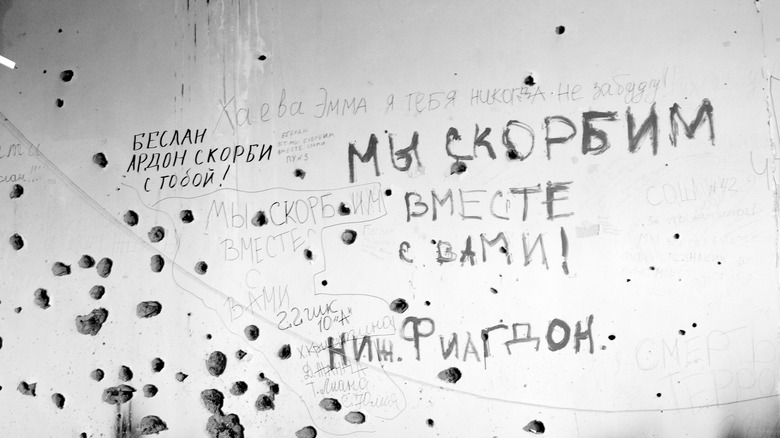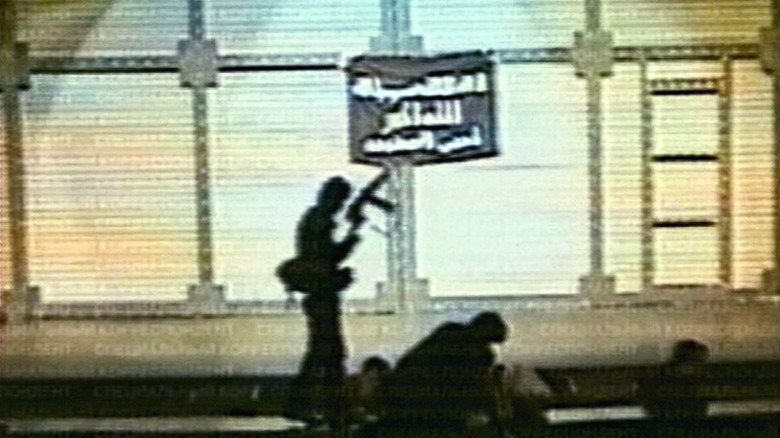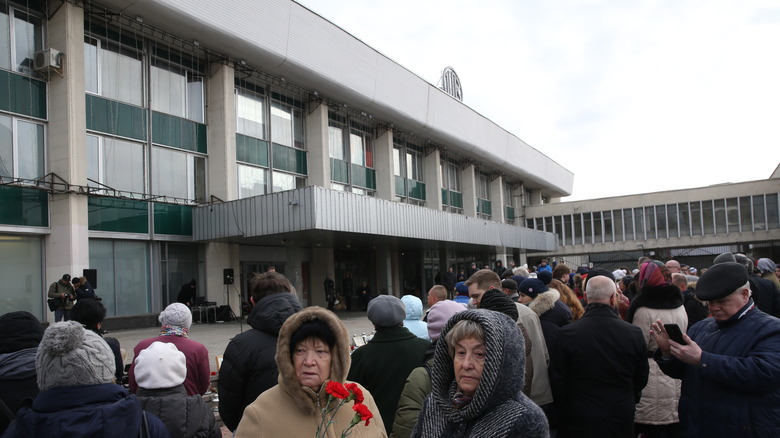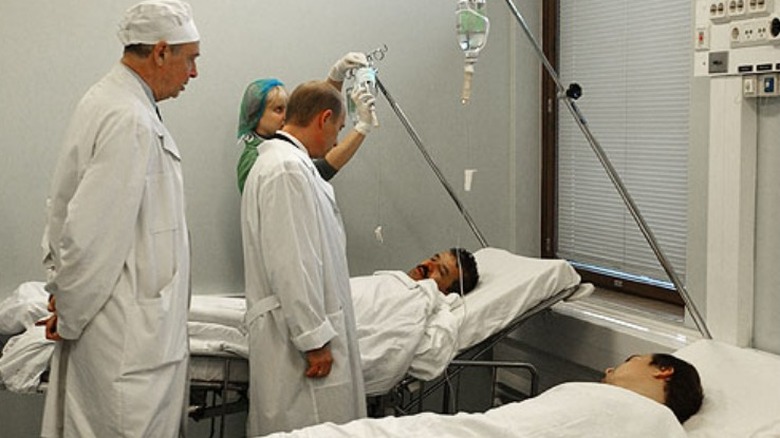The 2002 Moscow Hostage Crisis Explained
The Moscow theater hostage crisis was a catastrophe that was played off as a success. Rather than attempting to free almost 1,000 hostages held captive by Chechen-led militants, Russian authorities decided to instead flood the venue chambers with a gas to render everyone unconscious.
In a way, the plan to subdue the hostage-takers worked in that it rendered the attackers unconscious, but all of the hostages were affected as well. And since no one was told that the operation was going to happen, hospitals were suddenly overwhelmed with unconscious victims and doctors had to guess what kind of gas had been used.
Although more than 100 hostages were confirmed by the government to have died as a result of the gassing (with some alleging the true total is closer to 200), the crisis ended up helping the newly elected Vladimir Putin "to consolidate his grip on power," per the BBC. And although it didn't mark the end of the Second Chechen War or that of the Chechen independence movement, this incident demonstrated exactly how far the Russian government was willing to go.
The Second Chechen War
From August 1999 to April 2009, the Russian Federation fought against the Chechen Republic of Ichkeria in what is known as the Second Chechen War. This conflict came three years after the First Chechen War, which the Yeltsin regime had been sure they would win, yet had instead ended with a Chechen victory, writes Small Wars Journal.
In August 1999, the Chechen-based Islamic group IIPB invaded the Republic of Dagestan "in an effort to support a local separatist movement," per WIIS. Early Russian military response was slow, and a majority of the resistance came from Dagestani locals, writes MERIA. The invaders were startled by the lack of support since they had believed that this could lead to a rebellion against the Russian Federation for Dagestan too. Instead, people in Dagestan "considered them occupants and unwelcome religious fanatics."
According to Al Jazeera, after more than 300 Russians were killed in a series of apartment bombings, "Moscow blamed Chechen rebels and embarked on an epic 'anti-terrorist operation.'" Meanwhile, Vladimir Putin had just been elected prime minister, and he decided to make "the pacification of Chechnya" his main goal, leading a full-fledged military operation in Chechnya. However, Business Insider reports that some suspect that the Russian authorities were behind some of the bombings.
Seizing Dubrovka Theater
On October 23, 2002, 40–50 Chechen people stormed Dubrovka Theater in Moscow, Russia during an evening performance of the musical "Nord-Ost." The Moscow Times reports that just as the second act of the musical was starting, a masked man came onto the stage and started shooting into the air with an automatic rifle.
Heavily armed with firearms and explosives, the terrorists seized the venue filled with almost 900 people and threatened to kill everyone in the theater unless the Russian Federation agreed to end the war in Chechnya, according to The Middlebury Institute. During the first few hours, 15 children under the age of 12 were released, but Free Russia reports that there were "no real negotiations" during the first 57 hours of the Moscow theater hostage crisis.
"The captors did not allow loud conversation or movements around the hall, so the theater was eerily quiet except for the shooting [...] The Chechens shot at the doorways every time they heard a rustle outside."
Pumping gas into the building
On the night of October 25, the hostages were told by Movsar Barayev, the leader of the Chechen hostage-takers, that negotiations would begin the following morning, and that "everyone could relax until then, because there would be no assault until negotiations began," per The Moscow Times. But the negotiations would never occur. At around 5:30 a.m., Russian special forces pumped "a mysterious gas" into the theater before storming it. The gas knocked out all the attackers, but it also knocked out the hostages. Many ended up choking on their own vomit or were crushed to death as the unconscious bodies were piled into buses to be taken to the hospital, writes Radio Free Europe.
All of the Chechen kidnappers died as a result, and according to The Guardian, "at least some had been rendered unconscious by the gas before being shot." Meanwhile, doctors at the local hospitals struggled to treat the survivors since Russian officials refused to say what gas they had used. According to the BBC, many assume that the gas was "a compound based on fentanyl," an opioid that's significantly more potent than morphine.
What happened to the hostages?
Since the operation was carried out in total secrecy, public health officials had been unable to plan for the catastrophe. And the BBC reports that "police did not clear the nearby streets of parked vehicles, so ambulances arrived at the scene an hour-and-a-half after the start of the operation."
Although the Russian government claims that 130 people died during the Moscow theater hostage crisis, "an advocacy group for victims and relatives says the number is 174," per Radio Free Europe. And according to The Moscow Times, despite complaints from the relatives of the hostages, prosecutors ultimately "decided not to bring charges against health-care workers or special service officers." Russian citizens were offered a small government-ordered compensation, but those who lost relatives that weren't citizens of Russia received no compensation for the loss of their loved ones.
As of 2021, the actions of the Russian authorities have yet to be investigated. Meanwhile, Federal Security Service Deputy Director Vladimir Pronichev, who managed the operation, was awarded the title "Hero of the Russian Federation" by Putin.
